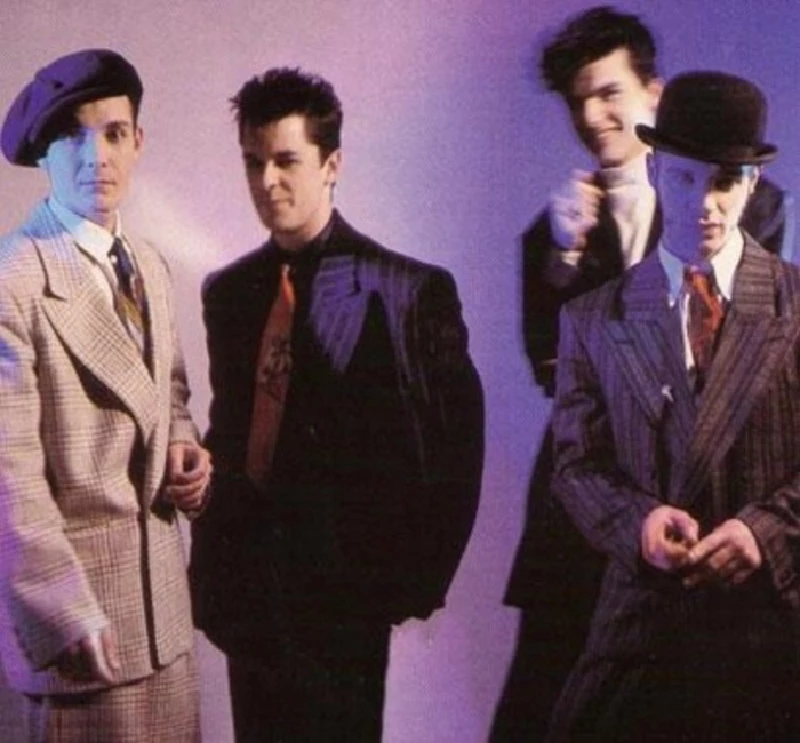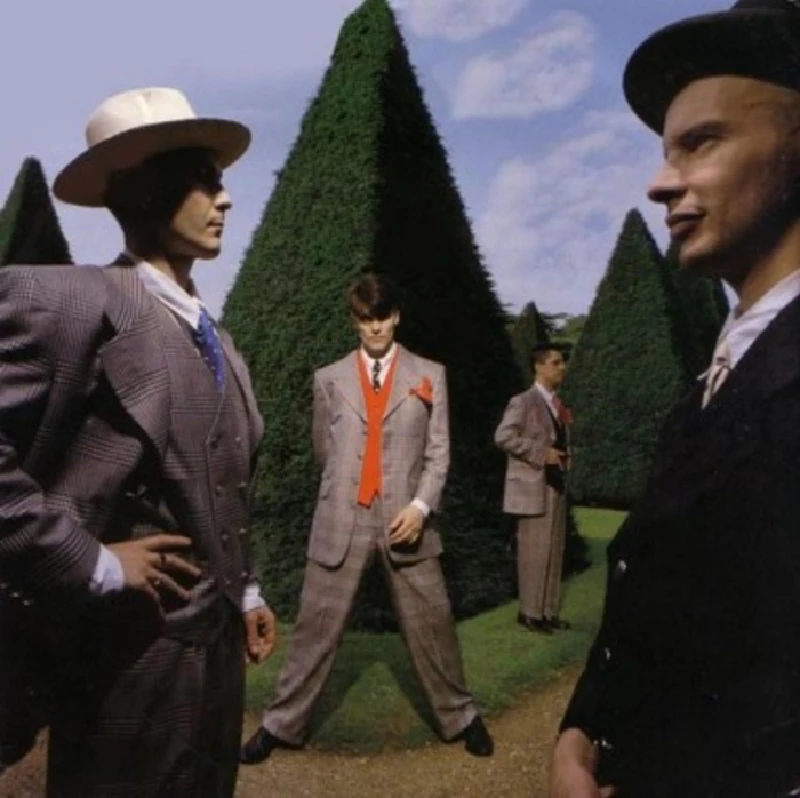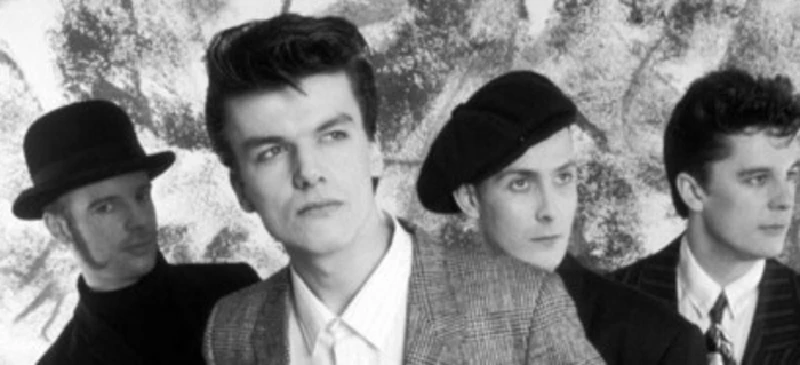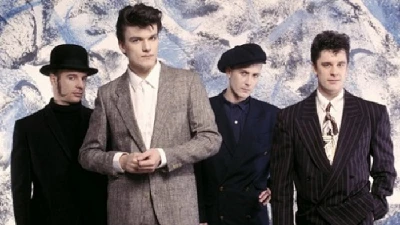Blow Monkeys - Interview
by John Clarkson
published: 21 / 9 / 2008

intro
One of the best known groups of the 1980's, the Blow Moonkeys have recently reformed after eighteen years apart. Vocalist Dr Robert speaks to John Clarkson about the grop's past and 'Devil's Tavern', their first album in eighteen years
The Blow Monkeys were one of the best known and most distinctive acts of the 1980's. Formed in London in 1981, their music was a hybrid of styles. They began their career as a new wave group, became a commercial pop act and by the close of the decade and their break-up in 1990 had become a dance group, but throughout fused their music with a rich variety of other genres as well including jazz, funk, soul and world music. Thee group, which consisted of Dr Robert (born Robert Howard ; vocals, guitar and piano) ; Mick Anker (bass) ; Neville Henry (saxophone) and Terry Kiley (drums), released five albums all on RCA, 'Limping for a Generation' (1984), 'Animal Magic' (1986), 'She Was Only a Grocer's Daughter' (1987), 'Whoops...There Goes the Neighbourhood' (1988), and 'Springtime' (1989). They also released over twenty singles, including 1985's 'Digging Your Scene', which got to number 12 in the UK singles chart, and 1987's 'It Doesn't Have to Be This Way' which went Top 5. 'Wait', a duet between Dr Robert, who was billed as Robert Howard, and soul singer Kym Mazelle meanwhile reached number 7. They were always political and never afraid to tackle difficult subjects. 'Digging Your Scene' was about AIDS and the anti-Margaret Thatcher anthem 'Celebrate' (The Day After You)', which featured a guest appearance from the late Curtis Mayfield, was banned by the BBC in 1987. After nearly eighteen years apart, the Blow Monkeys, with all four original members on board, got back together at the end of last year. They played, beginning at the 80's Retro Fest near Glasgow, a ten date tour of the UK in September and have also just released on their own Blow Monkey Music label their sixth album, 'Devil's Tavern'. Despite the Blow Monkeys' long absence, 'Devil's Tavern' finds them having lost none of their eclecticism or political edge. Tracks include the gorgeous West Coast pop of opener 'The World Can Wait', the abrasive anti-capitalist funk of recent single 'The Bullet Train', and Sinatra-style big ballad 'Travellin' Soul'. Pennyblackmusic spoke to Dr Robert, who has released eight solo albums during the group's layoff, about both the Blow Monkeys' past and their return. PB : Each Blow Monkey album is different from one another and every song sounds distinctive. Is it important to you to try and do something different with each new recording ? Is that something you strive for or does it happen quite naturally ? R : There is no point in repeating yourself . Especially in the 80’s we were always trying to move on and to find something new to do. We started off pretty much as a regular four piece and then we expanded and started making dance music with other people later on. Then on this new album, 'Devil's Tavern', we went back to where we started from again with just the four of us. It wasn’t calculated or anything. It is just that there is no point in repeating yourself. It was never as if we found a big formula and thought, “Right, we’ll stick with that.” We just kept evolving. PB : Your music is very eclectic and merges many different genres and influences. Do you all bring something different to the group in your influences or do you find those influences collectively ? R : I write the songs so I guess that my influences in terms of songwriting are the biggest ones. They change all the time as you continually discover new things as you evolve. In terms of our sound Terry, our drummer, however, comes from a jazz background and that was quite influential and still is. Mick, the bass player, is more a a sort of funk guy and Nev, the sax player, doesn’t have really any kind of musicial background. He prides himself on not being a muso, so he is not a jazz player or anything. We all bring something different to it. PB : You signed to RCA in the 80's and you remained with them from your first album, ‘Limping for a Generation’ until the last one, ‘Springtime for the World’. They were at that stage a real corporate giant. You were quite politically left wing in the 80’s. They seemed to give you a lot of freedom to say what you want. Was that always the case ? R : Yeah, there was never any attempt to try and shut us up really. They wanted a band that had something to say and which were prepared to say it. The 80’s were a very political time as well. I just wanted the biggest platform to get our music across. I was just writing about things that happened to me and things that were happening around me. We didn’t start out with the idea of being a political band. Life changes and things happen and you start writing about those things. PB : Do you tend then in your songwriting to write about whatever is bothering you the most ? R : Whatever is going on in my life does tends to affect my songwriting a lot, but I don’t write literally about it. I take that as a starting point and then abstract it somewhat. There has to have something for me to go out and sing my songs for night after night on tour. I have to be able to connect with the emotions behind each song. PB : Do you still get a buzz performing on stage your old songs from the 80’s ? R : More than ever. We just finished a short tour in the UK and we played half songs from the new album and half old songs that people knew. We redid the old songs in a way that everyone felt comfortable with and I think they really worked. It is probably the best that we ever played. It has been really good fun to be back in a band again. PB : The new album once again finds you breaking new ground, yet you played the Retro Fest festival near Glasgow at the beginning of tour . Do you worry sometimes about being branded as another retro act ? R : No. I wasn’t very keen on doing that show, but I got talked into it as a good way of starting the tour. Those kind of gigs are not something that I plan on doing that many of. The whole reason for us getting back together was to go and do a new record. We have been offered all that kind of stuff before. Doing something like that is doing pantomime I think. It was important for us to go out and have something new to say. We made a real point at the Retro Fest of playing new stuff and I think that is probably the first and last of that kind of gig which we will do. PB : ‘Devil’s Tavern’ was funded by your fans through your website. How did that work ? R : Other bands have done something similar. It wasn't a new idea, but it seemed like a very good idea. It means that you cut out the middle man, and that we didn’t have to go around begging from record companies and putting ourselves in a position of giving away most of what we made. We could do it ourselves with our fans' help, and there were enough people out there willing to part with fifteen quid to help us make it. I thought it was a perfect arrangement. They got an album. We got to make one and everybody was happy, and we didn’t have to do it through a record company. PB : You recorded it in Spain. You live there now. Was that why you decided to record it there ? R : Yeah, I live in Spain there most of the time. I love it there. I have found a little studio near where I live, and I recorded an album there last year with PP Arnold. It is only a small, cheap little place, but it has got a great vibe and I thought that I would love to get the boys over here and make the recording special and give it a little bit of an atmosphere. They jumped on Ryan Air and came over.. It was great. PB : Was it an album that took a long time to record or was it done quickly ? R : We did it pretty much in two weeks, and then took a couple of days here and there after for extra mixing. It was pretty.. PB : Why did you decide to get back together again now after this eighteen year break ? You have had a pretty successful solo career in the mean time and released eight albums. R : I just got to the point where I thought I fancied being in a band again. I had written some songs that I thought would really suit the band. They were at a similar stage to me in their lives. Their kids are largely grown up now. Their families are not as dependent on them being there. They all felt like there was a bit of unfinished business and all wanted to get out and play again. The timing was right for everyone. Everyone was really clear though that the only way we would do it was to try and come up with something new. PB : Was the chemistry instant again when you did get back together or did it take a while ? R : It was pretty instant. It just worked. Nev, the sax player, hadn’t picked up a sax for eighteen years, but he sounded better than before. It was fine. PB : How much contact had you had with each other in the mean time ? R : Not much. I hadn’t seen Tony, the drummer, for fifteen years. It was pretty minimal (Laughs), but when ww broke up we were all still friends. There were no hard feelings, no court cases, no nastiness. We started from where we left off with really. We all had had lives to get on with. It was fantastic meeting up with them all up again. We hope to continue with it for a while now. PB : Are you planning to go on then ? R : I think so. I am really happy with the record. I think we are going to put another single out, go out on tour again next year, give it a real go internationally and maybe make another album. I am really enjoying it and we have had a good reaction to the record. There is no reason to stop. PB : Why did you decide to break up back in 1990 ? R : We had all started families. We had been together for ten years at that point and we had come to the end of our contract with RCA. I fancied being solo and having the freedom to work with other people and they all felt the same. We had been touring constantly for years and I think we all needed a rest from that. It was a watershed time really. PB : ‘Digging Your Scene’ was about AIDS. Were you surprised when it became such a massive hit ?: R : I didn’t think it would be a hit. I didn’t think it had a hit chorus. I thought you had to have a big hook, but I am terrible at picking singles. I was pleasantly surprised. It changed our lives really. PB : Were you surprised when ‘It Doesn’t Have to be This Way’ was a big hit as well ? R : I was less surprised by that. We had had other hits by then. I knew that we had a chance of getting played, whereas with ‘Digging' we were still a relatively unknown band. You just never know whether the radio is going to pick on anything you do or whether people are going to like it . PB : You had been together for four or five years by the time 'Digging Your Scene' went into the charts. R : We had. Yeah. We had served our dues. We had played three or four years of dives in and around London trying to get record companies to come and see us and living on the dole. We were around for quite a while before we even got signed , let alone had any success. PB : You also played the Red Wedge tour in 1987. Was that an experience you enjoyed ? R : I did enjoy it. It was the first time that I had been involved in something like that when bands came together and left their egos in the dressing room and did something because they had a lease in it. I think the bands had more of a lease in it than the politicians actually. For me it was a positive thing at the time. It is easy to knock it now. It looks quite naive in retrospect, but at the time it felt good. We appeared on the same bills as the Communards, Lloyd Cole, the Style Council and Billy Bragg.. PB : Most of your albums and many of your singles featured at least one duet or collaboration. You worked with the likes of Eek-a-Mouse, Cheb Khaled, Kym Mazelle and Curtis Mayfield. Why did you decide to work with these people ? R : The whole point about music for me is sharing. I love that thing of bringing people together through music. Certain songs just suggested things to me and I thought, “Why not give it a go ? See if we can get Curtis Mayfield or Eek-a-Mouse” ? PB : Were those collaborations easy to set up ? R : Not always, but I was pretty persistent and luckily the other artists were into it. PB : ‘Celebrate (The Day After You)’ was one of Curtis Mayfield’s last important recordings. How did you become involved with him ? R : He was doing a tour towards the end of 1986 and I knew that he was in London and playing Dingwalls in London. I went along to see him and somebody told me the hotel he was staying in there, so I went up to his room and knocked on his door (Laughs). It was pretty forward of me really (Laughs) , but I went in and introduced myself and told him I had a song and gave him a demo. He sat there and listened to it on the headphones and said that he was into it. It was pretty painless really. We did the recording a couple of weeks after that. It was nerve wracking doing it with him, because to me he was the man. He was a legend, but a lovely man as well. PB : Did a lot of these other collaborations come together on the similar off chance, and through seeing people at gigs ? R : Some of them. I was living in Brixton at the time and saw Ee-a-Mouse at a gig there. Kym Mazelle I met at a club. That is how it tends to happen. PB : ‘Celebrate (The Day After You)' was banned by the BBC in 1987. Were you surprised when that happened ? R : Yeah, I thought it was stupid. It was hardly a threat to democracy. It was just a simple tune about imagining having a party the day after Margaret Thatcher left office , presuming that she would lose the next election. They banned it because an election was called the same week the record came out and they said that they didn’t want to release records with a political bias. PB : Were you surprised when she got back in again ? R : No, not really. I kind of thought that would happen. You live in hope though (Laughs). PB : You also turned up on the ‘Dirty Dancing’ soundtrack. R : Yes. That was a freak thing. We were invited to appear on it and nearly turned it down, but in the end decided that it would be a bit of fun. We got to do a cover of an old Lesley Gore, ‘You Don’t Know Me’. That soundtrack ended up being massive. PB : The final two albums before you splt, ‘Whoops. There Goes the Neighbourhood’ and ‘Springtime for the World’, did less well. Why do you think that was ? R : They didn't have big major hit singles on them, which of course helps (Laughs). ‘Wait’ was on 'Whoops ! There Goes the Neighbourhood', but that was more like a solo thing between me and Kym Mazelle. ‘Whoops, There Goes the Neighbourhood’ was probably not our strongest album if I am honest. You try your hardest every time, but you never know until afterwards why it hasn't worked. ‘Springtime for the World’ was definitely a bit too leftfield for a lot of people, although it dis get a lot of credibility from the underground club scene. People picked up on things like ‘La Passionara’. That album in retrospect sounds, without meaning to blow my own trumpet, ahead of its time. PB : What do you think is the Blow Monkeys' strongest album ? R : It changes really, but I prefer at the moment our first album, ‘Limping for a Generation'. It was just the four of us and we have gone back to working that way on this latest album. The songs on ‘Animal Magic' and 'She Was Only a Grocer’s Daughter’ were stronger, but the production on them was too much. It is difficult to say. It changes all the time. If I am really honest, I think our best is ‘Devil’s Tarvern’. PB : You seem to have lost none of your edge political or otherwise, especially on songs like ‘The Bullet Train’ ?. Do you think that you have mellowed with age or are you still just as actively socially concerned as ever ? R : I am still angry about the same things. I am still motivated by the same motivations. I am not as party political as I may have been twenty years ago. I have kind of lost faith in that process. I think that if I was a young man now starting out I would be looking for other ways of trying to change things or say my bit, but I have still got fire in my belly when it comes to writing and performing. I think without that you’re on to a loser. I don’t think I would be able to go through all the other shit you go through to have to get there without it. You have to be pretty motivated. I don't think I have mellowed at all. PB : Last question. You have mentioned that you want to take things further with the Blow Monkeys. Are you going to be running your solo career in conjunction with that ? R : I am. Yeah, because the solo career gives me the chance to another side of myself musically. It is more personal. and I guess more folky. It is something that I will continue to do. After this tour that we just did, I went and did a couple of solo gigs as well to keep my hand in. I think that it is possible to keep both things going because I have got enough songs in me. I hope to keep both going. PB : Thank you
Picture Gallery:-


profiles |
|
Blow Monkeys (2013) |

|
| Dixie Ernill looks back on the early career of UK pop band the Blow Monkeys, whose first two albums, 1984's 'Limping for a Generation' and 1986's 'Animal Kingdom'. have just been reissued in double CD editions |
most viewed articles
current edition
Peter Doherty - Blackheath Halls, Blackheath and Palace Halls, Watford, 18/3/2025 and 21/3/2025Armory Show - Interview with Richard Jobson
Liz Mitchell - Interview
Lauren Mayberry - Photoscapes
Deb Googe and Cara Tivey - Interview
Max Bianco and the BlueHearts - Troubadour, London, 29/3/2025
Garfunkel and Garfunkel Jr. - Interview
Maarten Schiethart - Vinyl Stories
Clive Langer - Interview
Sukie Smith - Interview
previous editions
Heavenly - P.U.N.K. Girl EPBoomtown Rats - Ten Songs That Made Me Love....
Trudie Myerscough-Harris - Interview
Doris Brendel - Interview
Beautiful South - Ten Songs That Made Me Love...
Dwina Gibb - Interview
Pulp - Ten Songs That Made Me Love...
Kay Russell - Interview with Kay Russell
Barrie Barlow - Interview
Sound - Interview with Bi Marshall Part 1
most viewed reviews
current edition
Davey Woodward - Mumbo in the JumboNigel Stonier - Wolf Notes
Wings - Venus and Mars
Kate Daisy Grant and Nick Pynn - Songs For The Trees
Only Child - Holy Ghosts
Neil Campbell - The Turnaround
Philip Jeays - Victoria
Darkness - Dreams On Toast
Suzanne Vega - Flying With Angels
Charles Ellsworth - Cosmic Cannon Fodder
Pennyblackmusic Regular Contributors
Adrian Janes
Amanda J. Window
Andrew Twambley
Anthony Dhanendran
Benjamin Howarth
Cila Warncke
Daniel Cressey
Darren Aston
Dastardly
Dave Goodwin
Denzil Watson
Dominic B. Simpson
Eoghan Lyng
Fiona Hutchings
Harry Sherriff
Helen Tipping
Jamie Rowland
John Clarkson
Julie Cruickshank
Kimberly Bright
Lisa Torem
Maarten Schiethart